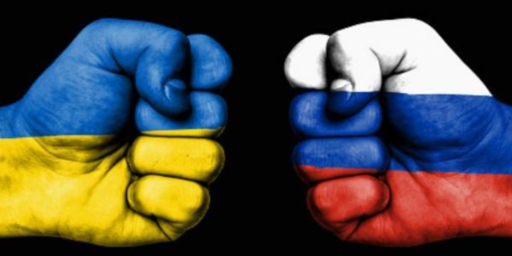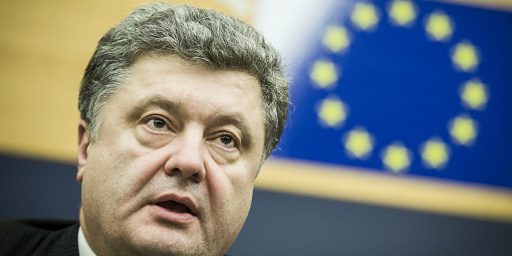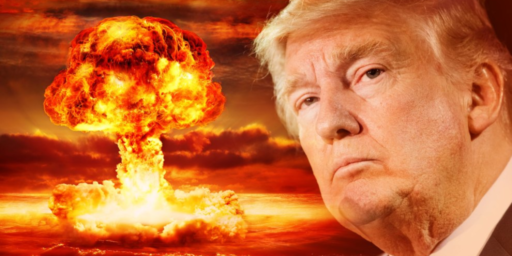The U.S. And NATO Should Stay Out Of The Russia-Ukraine Fight
Notwithstanding the temptation to do something, both the United States and NATO need to resist the temptation to get involved in the latest conflict between Russia and Ukraine.

The President of Ukraine is pushing for the United States and NATO to get involved in the current conflict between his nation and Russia in a big way:
The president of Ukraine is urging NATO to deploy warships to the Sea of Azov, a proposal that has been sharply criticized by Russia as a provocation that could worsen tensions between the two countries following a weekend confrontation in the waters off the Crimean Peninsula.
U.S. President Donald Trump said Thursday he was canceling a planned meeting with Russian President Vladimir Putin at the G-20 summit in Argentina because Moscow has not released the Ukrainian vessels and sailors it seized
In an interview published earlier Thursday with the German daily Bild, Ukrainian President Petro Poroshenko laid out his hope that NATO would “relocate naval ships to the Sea of Azov in order to assist Ukraine and provide security” against Putin’s expansionist ambitions.
The Russian coast guard fired on and seized three Ukrainian vessels and their crews on Sunday. Russia alleged the Ukrainian vessels had failed to obtain permission to pass from the Black Sea into the Sea of Azov through the Kerch Strait. Ukraine insisted its vessels were operating in line with international maritime rules in the strait, which separates Russia’s mainland and the Crimean Peninsula that it annexed from Ukraine in 2014.
While condemning the Russian action, NATO is not expected to send ships to the area, a deployment that could trigger a confrontation with Russia. A 2003 treaty between Russia and Ukraine stipulates that permission from both countries is required for warships from anywhere else to enter the internal sea.
NATO spokeswoman Oana Lungescu said the alliance already has a strong presence in the region, and that NATO ships routinely patrol and conduct exercises in the Black Sea, especially those from Bulgaria, Romania, and Turkey, which border the sea.
(…)
There has been growing hostility between Ukraine and Russia since Moscow’s annexation of the Crimean Peninsula from Ukraine in 2014. Russia has also supported separatists in Ukraine’s east with clandestine dispatches of troops and weapons. Fighting there has killed at least 10,000 people since 2014 but eased somewhat after a 2015 truce.
The naval incident marked the first overt clash between Russian and Ukrainian militaries since the 1991 collapse of the Soviet Union. It has fueled fears of a wider conflict and has drawn strong criticism of Russia from the U.S. and its allies.
Amid the tensions, the Russian military said it had deployed another batch of the long-range, S-400 air defense missile systems to Crimea.
This isn’t the first time that Poroshenko has sought to get the United States and NATO involved in the conflict between his nation and Russia that began when Russia seized and annexed the Crimean Peninsula more than four years ago. Several times during this period, Poroshenko has attempted to persuade the leaders of the NATO alliance, President Obama, and other American politicians that the west needed to get more heavily involved in the conflict than it has to do. So far, those pleas have gone unheeded except to the extent that the west has imposed heavy sanctions on Russia for its actions in Ukraine and the aid that it has provided to pro-Russian rebels in eastern Ukraine. Additionally, the United States has provided Ukraine with some defensive weaponry as well as medical and other supplies. However, both NATO and the United States have stopped short of the kind of aid that Poroshenko has requested, and they would be wise to decline this latest request for assistance.
Daniel Larison comments further:
NATO countries have no reason to involve themselves in this dispute. Ukraine is not a member of NATO, and the alliance has no obligation to assist in their defense. Introducing NATO vessels into the area would be extremely provocative and risks unnecessary escalation. Western governments can and should appeal to Moscow to release the seized Ukrainian vessels and their crews, but they have no right to deploy naval vessels in the Sea of Azov. As the AP report explains, “A 2003 treaty between Russia and Ukraine stipulates that permission from both countries is required for warships from anywhere else to enter the internal sea.” Russia obviously won’t be giving NATO ships permission to enter, and there is no compelling reason why NATO should be taking sides in this conflict.
Dave Schuler takes a similar position:
It seems to me that the simplest explanation is that the Russian government is abrogating its 2003 treaty with Ukraine in which the Sea of Azov, only reachable via the Kerch Straits, at its narrowest point less than two miles wide, was to be under the joint control of the Russian and Ukrainian governments.
But that treaty was signed with a different, pro-Russian government. I condemn unequivocally Russia’s actions which amount to seizing the Sea of Azov. It is not unexpected. There is no conceivable way that Russia will surrender the Port of Sevastopol and even a passing familiarity with Russian history is enough to convince one of that. Russia’s actions in Ukraine were inevitable once U. S.-backed revolutionaries removed the previous government. Now we have a situation in which Russia is annexing Ukraine by degrees.
What should the U. S. reaction to the incident be? I believe that we should condemn it but otherwise not involve ourselves in the conflict between Russia and Ukraine. The present government of Ukraine are neo-fascists. We should not support them. Ukraine must come to a modus vivendi with Russia and arming Ukraine or otherwise supporting its conflict with Russia does not promote U. S. interests.
This doesn’t mean that the U.S. and NATO should stay entirely uninvolved in the current crisis. As Larison notes, we should be putting pressure on both nations to de-escalate the current situation. With respect to Russia, that means that they need to release the Ukrainian sailors they are holding and return the ships that were seized to Ukraine as soon as possible. With respect to Ukraine, it means that we should encourage them to step back from the declaration of martial law that was recently announced that seems to be aimed more at limiting the ability of anti-regime forces to organize ahead of upcoming elections than it is at addressing any serious threat to Ukrainian sovereignty. What we don’t need to be doing, though, is putting ourselves in the middle of this conflict or taking sides in a matter in which our national interests are not implicated and which would not be in the interests of the NATO alliance to address. For that reason, we need to make clear to the Russians that the kind of behavior they are engaging in is not acceptable in the modern world and that they are risking further sanctions if they continue down this road. At the same time, though, we ought to make it clear to the Ukrainians that they aren’t going to see either the United States or NATO come to their rescue and they need to act accordingly.





Let me see if I have this straight. The US Navy should sail a bunch of ships into a small body of water with a very narrow egress, within easy range of all the bombers and missiles the Russians care to deploy. That’s the idea?
Do neocons know nothing of basic military realities? Air power trumps sea power, it has since the war in the Pacific 70 years ago. You do not expose assets to overwhelming enemy force. The fact is, the reality is, that no combination of US naval forces would last half a day in the Sea of Azov if the Russians wanted us gone. Are we seriously talking about risking WW3 over Ukraine? Ukraine? Because of its great strategic value to us?
We should give Ukraine lip service, impose some sanctions, make the usual noise, and keep the navy out of reach of land-based bombers.
Individual #1’s boss is not going to let him interfere.
@Michael Reynolds:
The expectation is that the Russians would not dare attack the US ships, since they don’t want to start WW3. The ships would be sacrificed in any hostilities, and simply make the costs of the conflict too high to consider.
We actually do something very similar around the islands China has built in the South China Sea, to demonstrate that we do not accept their territorial claims of the entire South China Sea.
And the troops in South Korea have a similar mission. They aren’t going to defend against a North Korean attack, they are there to ensure a North Korean attack on South Korea also kills a bunch of American soldiers so we have to get involved.
I’m not saying it is a good strategy here, but it’s a strategy that we use elsewhere to good effect.
Here, I would half expect a shot or two from Ukrainian artillery, trying to escalate things. Dumb as hell to do this where there is active military.
@Michael Reynolds:
You can also send some minor, showy vessels, like cruisers, to patrol the territorial waters of NATO members nearby. And let the Soviets, I mean “the Russians,” very quietly know they’re there and, if attacked, will defend themselves.
IMO this lets them know NATO members are still off limits, even if Ukraine isn’t.
Containing Russia isn’t going to happen from the US, not with this administration. Asking what *we* should do is just an exercise in futility. This is going to be up to the EU, and others.
Russia should also pay a very clear price. Does the EU need Russian gas and oil more than Russia needs to sell it? Does G19 have a ring to it? This needs a large economic or diplomatic response.
Good thing that we insisted that Ukraine surrender it’s nuclear weapons stockpile 25 years ago in exchange for security guarantees.
@Gustopher:
Hard question. Europe has other sources of oil. But removing a major source like Russia would drive prices way up. No one likes that (ask the French). never mind the pipelines already in existence. So it would be difficult and expensive.
Russia, on the other hand, depends much more on revenue from oil and gas. Still, if Europe won’t buy it and the price goes up, then someone else will.
Face it, people will buy oil from Satan if they need it, and we always need it.
So what you want is to ban sales of Russian hydrocarbons. I just don’t see it. See the paragraph above. Besides, it would require moves like blockading sea or land routes. The reaction of a nuclear power with a large military to a blockade is left as an exercise for the student.
@Gustopher:
Russia is effectively contained, even if Turkey being unreliable as an ally with Erdogan. Until the Artic melts the United States, either with NATO or South Korea/Japan, controls the access to all Russian warm ports.
Even with a complete idiot in the White House that’s effectively containment. Russia reacts like it does does because they are weak, not because they are strong. It’s a barking dog that does not bite.
I think we should stay out militarily, but there are non-military things we can do. One suggestion I saw that seemed like a good idea was, until Russia restores freedom of navigation in the Sea of Azov, we ban US flagged ships from visiting any Russian Black Sea ports and any foreign flagged vessels that have visited Russian Black Sea ports from landing at US ports.
@Gustopher:
I never like the idea of bluffing, especially in a showdown between two psychopaths. We bet they won’t pull the trigger, they bet we won’t pull the trigger. And this is Putin and Trump we’re talking about. The only reason we think Putin’s clever is because Trump is dumb, but he’s no deep, strategic thinker.
This kind of land-grab imperialism went out of style for good, practical reasons, starting with millions of pissed off Ukrainians who can figure out how to make IEDs. He’s got his hand up the rear of the President of the United States and still can’t monetize that beyond having some fun watching Trump grovel. He’s a poker player who gets to see the other guy’s hand and still can’t win. God knows he’s smarter than Trump, but that’s a very low bar. He could well fire off a missile at a ship in the Sea of Azov and start WW3. If he moved quickly he could manage it before Trump managed to tweet surrender.
Simple thing is that the time of AMERICAN order is finished, all the European countries were depending on American,but now situation is different America itself cannot fight war with Russia. European are pushing American and American’s are pushing European against Russia but in reality NATO and Americans both together can’t afford to fight Russia and they know it. Russia warned of NATO expansion but NATO wanted more countries to join and when time came to defend those countries NATO wants to give lip service. Best thing is that just accept Russian order and live peacefully. Russia is a strong country now just accept the fact. EU don’t have allies.
Russia is harassing the Ukraine because there is an idiot in the White House. A US President need not be a John McCain level interventionist hawk to limit Putin’s imperialist impulses, but he can’t be a compromised moron.
@Sleeping Dog
“Russia is harassing the Ukraine because there is an idiot in the White House.”
If Trump is a an idiot and a ‘compromised moron’ such that Russia feels free to harass Ukraine on his watch… how would you characterize his predecessor, who presided over the Russian infiltration of Donbass and the annexation of Crimea?
@Michael Reynolds: With the similar tactics in South Korea and the South China Sea, we aren’t bluffing — it’s part of our national security strategy. The Chinese have been rational actors — they test our resolve at the beginning of every presidency, but nothing escalates.
The troops in South Korea are as much to let China know that we are committed to a response in case of a North Korean invasion as it is to let the North Koreans know.
In these two cases, this type of brinkmanship arguably makes the world safer, as it makes us a much more predictable superpower. No sudden “Oh, it turns out we do care about Kuwait” incidents.
It would be a terrible idea to do it in the straight of Azov, where we don’t have clear goals that we have been maintaining for decades, and where there is an active insurrection where one side would really like us to get way more involved.
@Kathy: Gas might be the better route, honestly. The infrastructure to bring it to market is pretty intensive — mostly pipelines, rather than tankers — so they can’t just redirect it.
In 2009, the Russians cut gas exports to Europe, which hurt Russia almost as much as Europe. They have threatened to do so since, and it would be their go-to response to any major sanctions coming out of the EU. If the EU is better prepared than they were a decade ago, it’s likely the most effective economic sanction, and it would defang their threats to do so.
Eliminating educational visas could also be a nice trick — a lot of the children of Russian officials and oligarchs have studied abroad, so it would directly affect Putin’s most important supporters.
There are a lot of options of varying degrees of awfulness. I hope the EU finds one, and goes with it.
@jog267: Obama was never going to go to war over the Ukraine, and Putin was correct to figure this out. Obama did make it cost a lot more than Putin wanted to pay — with very strong sanctions that have affected the Russians.
Trump has been willing to blow it all off, and has said that he doesn’t support the sanctions. He has had his hands tied on this matter by the Russian collusion investigation, but he has also refused to implement the CAATSA sanctions. Putin has, wisely, or at least as wisely as a schoolyard bully needs to be, realized that he can consolidate his hold on Ukrainian territory and face no additional problems from the Trump administration.
Does that answer your disingenuous question?
@Akram:
Are you actually trying to sound Russian? Usually you boys from St. Petersburg are a bit better-trained.
@Michael Reynolds: The problem is the NATO treaties that commit the US to help defend some of these countries that Russia could attack. Russia needs ice-free ports for their Navy and will not let the small countries close them out.
This could very well be where a huge conflict breaks out. The US and other NATO allies would be at a disadvantage strategically. Too hard to get forces in there.
Lyndon Johnson always justified the Vietnam involvement with the SEATO treaties the US had.
Eisenhower warned about getting involved in overseas squabbles.
@Michael Reynolds:
This is worth repeating. Bluffing only works if nobody calls the bluff or is too stupid to understand the whole point of bluffing in the first place. Concepts like sabre rattling or MAD rely entirely on the notion that the other person doesn’t really want to fight but rather wants to gain something from the process they can get otherwise. They don’t want to pull the trigger in the your face, they want your {x} instead so they can be persuaded. If you get somebody like Trump who truly and honestly thinks they’re supposed to be punching it out instead of using physical threats to leverage things….. well, when all you have is a hammer, we all turn into nails.
This is a man who asked repeatedly in the same meeting why they couldn’t just nuke insurgents. He wasn’t making a joke, he wasn’t trying to demonstrate a point or philosophical plan. He asked why it wasn’t an option because he’s too dumb to get why that’s a bad idea in general. Add in that he’s a zero-sum thinker and bluffing isn’t going to go well….
@Tyrell:
NATO is the reason we’ve had 73 years without a major war. When you talk about ‘defending’ Europe, we are defending freedom, our own power, and not a minor consideration, major trading partners. This is a deal WE created. WE wanted to be leaders of the free world. And it is in OUR interest, if we have to go to war with Russia, to fight in there rather than here. And whenever your idiot president rants about Europe not contributing, remember: they are contributing their land and their cities and their civilian populations to a war, something we haven’t had to endure since the war with the confederacy.
Republicans spent decades bitching that Roosevelt had given the Russians control over Eastern Europe, accusing Democrats of treason and communist sympathies, and now, because you’ve elected a fcking moron and you have to slavishly obey his every tweeted imbecility, you’re all for trashing the Pax Americana, and handing a newly-freed Europe back to the Russians?
@Resistance Ron:
Doug (or more specifically his headline) is wrong — he is ignoring all the economic and diplomatic options. He is right that we shouldn’t be getting more involved militarily, but we shouldn’t be hands off.
The Obama/Clinton “reset” with Russia was a mistake. It was taken as a sign of weakness, and may have led to the Russian expansion in Ukraine.
Obama learned from the mistake, and responded with very tough sanctions. He made it more expensive than Putin was comfortable paying.
Trump learned nothing from the mistake (despite criticizing it) and has been signaling that he wanted to eliminate the sanctions from early in his campaign (fun fact: the first time he was asked about it publicly was by the Russian operative Marina Buriana (or something similar)). Trump has refused to implement sanctions for Russia’s interference in our elections. Trump has emboldened Russia to escalate.
(Expanding NATO to Russia’s doorstep was also a mistake. The Baltics aren’t worth WW3 if it comes to it, and their ports are central to Russia’s defense strategies, more so than Crimea… Turkey holds the bottleneck on the Black Sea, after all)
Refer to the USS Panay incident to learn what effect an expendable asset (full of American sailors) has on a determined rising hegemon.